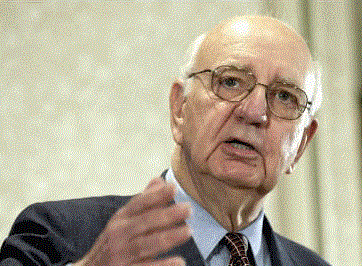Volcker and Lincoln softened by compromise bill

Lawmakers worked late into the night thrashing out an agreement on unifying the Senate and House of Representatives’ financial reform bills. That process is now largely complete and a House vote on the merged bill has been scheduled for Tuesday.
While the final details of the agreement have yet to emerge, it seems clear that Senator Lincoln’s proposal for banks to be forced to move their swaps trading desks into separately capitalised vehicles has been watered down. Reports suggest trading which qualifies as hedging a bank’s own risk – including at least some trading in interest rate swaps and forex swaps, which make up the vast bulk of the OTC derivatives market – will be allowed to remain in-house.
The Bank for International Settlements estimated that at the end of 2009 some $349tr of the $615tr over the counter derivatives market in 11 leading countries consisted of interest rate swaps. Another $100tr were forward rate agreements and interest rate options.
Inter-Democrat struggles
Lincoln appears to have bowed to pressure from senior Democrats – principally Collin Peterson, head of the House Agriculture Committee – to soften her proposal, to make the bill more amenable to Democrats representing New York, Boston and other financial centres.
Warren Davis, a partner at Washington law firm Sutherland, told FOi on Thursday he had heard such noises in Washington. “I have a feeling they’ll roll her over,” he said. “I think
Getting a bill through is further complicated by the fact that one or two Democrats may vote against it because they regard it as too weak.
A one-off $19bn levy to recoup some of the costs of the reform process, applicable to banks with assets of more than $50bn and hedge funds with more than $10bn, will be unpopular with banks but of little lasting consequence.
Winners from the bill are the Securities and Exchange Commission and Commodity Futures Trading Commission, both of which will gain bigger budgets and more staff. CFTC chairman Gary Gensler’s remit will be extended vastly to oversee the OTC market.
Treasury secretary Tim Geithner said he was pleased with the final result. “The bill that has emerged from conference is strong,” he said in a statement. “It represents the most sweeping set of financial reforms since those that followed the Great Depression. It establishes the greatest consumer financial protections in American history.
“It prevents financial firms from taking risks that will threaten the economy. And it provides the government with significant new tools to better protect taxpayers from the damage of future financial crises.”
“A good day for financial reform”
The reconciled House-Senate bill must still pass a final vote in both houses next week. “We urge Congress to carry the momentum forward and move swiftly towards final passage,” said Geithner, as he cast his eyes forward to this weekend’s G20 summit.
“The progress made over the past two weeks is enormously important for the country and provides crucial momentum for global financial reform. As the President travels to Toronto to attend the G20 Summit, Congress has shown that America is ready to lead by example.
“All Americans have a stake in this bill,” he concluded. “It will offer families the protections they deserve, help safeguard their financial security and give the businesses of America access to the credit they need to expand and innovate.
“This is a good day for them and for the cause of financial reform,” he insisted.
Those more zealous for radical reform were disappointed by the weakening of the Volcker Rule. An amendment based on the former Federal Reserve chairman’s idea of forbidding deposit-holding banks from proprietary trading and investing in hedge funds and private equity funds was agreed. But its scope was reduced by an amendment allowing banks to invest up to 3% of their core capital into hedge fund vehicles, provided they are matched by a client.
For instance, JP Morgan’s Tier 1 capital was calculated by Wells Fargo analysts in April as about $130bn – that would mean it could put $3.9bn into hedge funds.
Tom Osborn +44 207 779 8361 tosborn@fow.com
Found this useful?
Take a complimentary trial of the FOW Marketing Intelligence Platform – the comprehensive source of news and analysis across the buy- and sell- side.
Gain access to:
- A single source of in-depth news, insight and analysis across Asset Management, Securities Finance, Custody, Fund Services and Derivatives
- Our interactive database, optimized to enable you to summarise data and build graphs outlining market activity
- Exclusive whitepapers, supplements and industry analysis curated and published by Futures & Options World
- Breaking news, daily and weekly alerts on the markets most relevant to you


